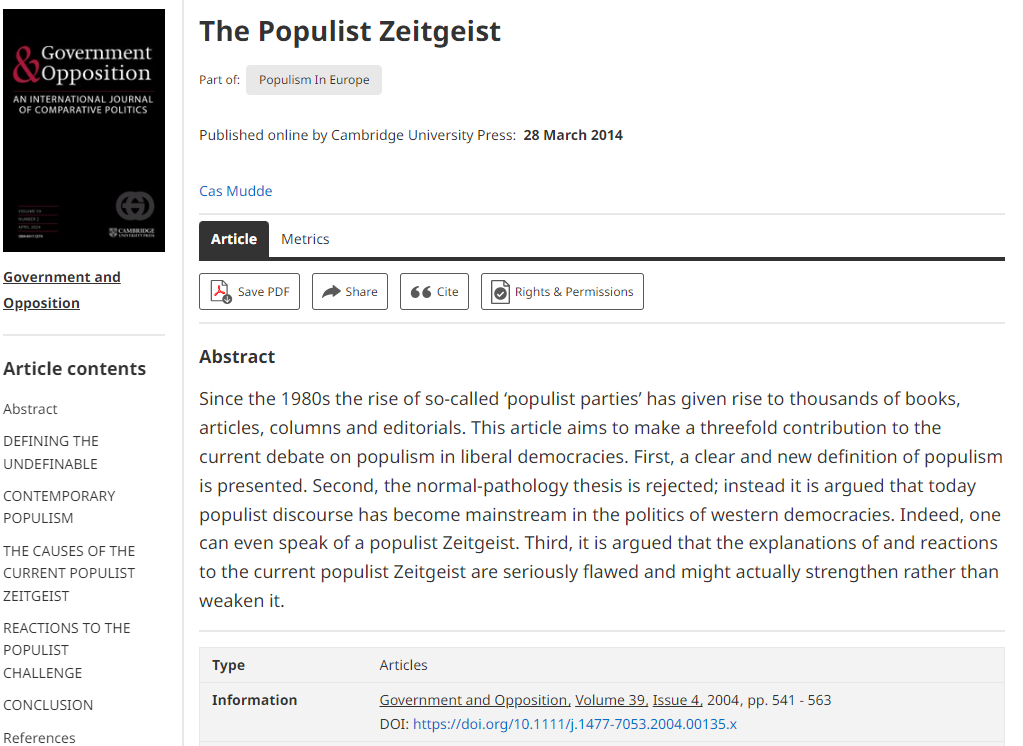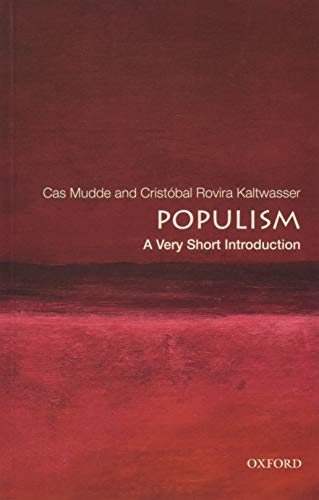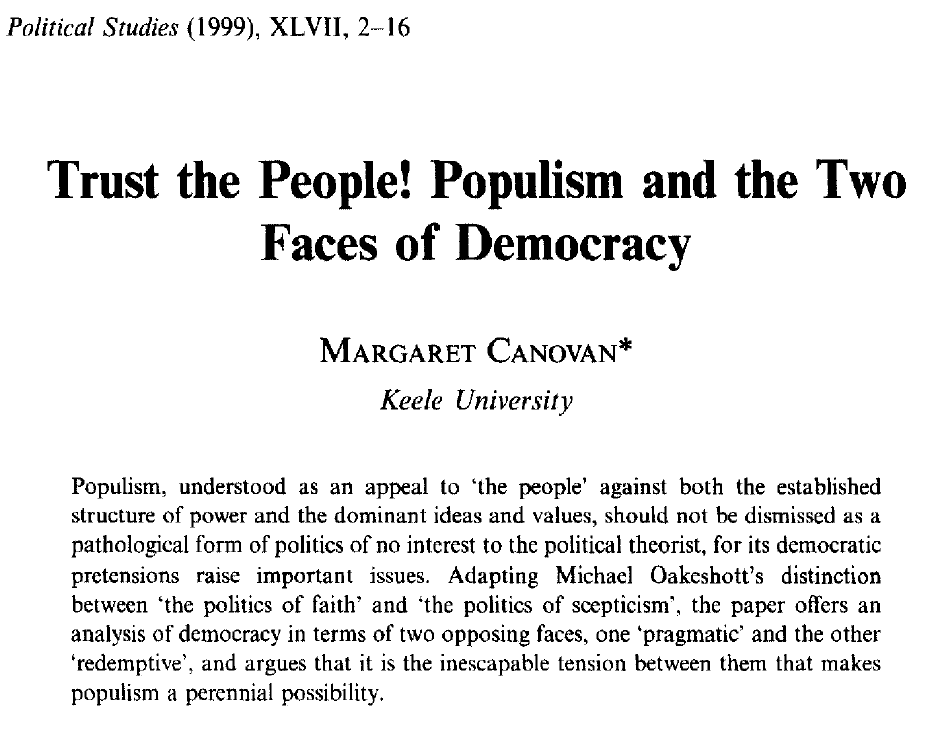One of the most iconic pieces of academic literature on populism celebrates its 20th anniversary since publication. We’re referring to “The Populist Zeitgeist”, Cas Mudde’s paper published by Government & Opposition in 2004. Since then, it has been cited thousands of times and has established itself as a guiding light for scholars in need of a definition of populism.
Without “The Populist Zeitgeist” this blog would probably not exist. But what arguments are developed beyond the definition of populism in the paper? What does the author think of it two decades after its publication? How has “The Populist Zeitgeist” aged so far? How has the field of populism studies evolved since 2004? POP asked all these questions, and more to Cas Mudde himself. Along the way, you’ll see mentions of Ernesto Laclau, Margaret Canovan, Peter Mair, Donald Trump, Robert Plant, and many others.
Enjoy the read…
1) Before talking about the paper itself, let’s go back to the early 2000s. Who was Cas Mudde at the time of writing the article? In what stage of your academic life were you, and what brought you to write “The Populist Zeitgeist”?
I had just moved to the University of Antwerp, coming from the University of Edinburgh (after my first job at the Central European University in Budapest), and was an advanced assistant professor. I had shunned the concept of “populism” for most of my career, mostly because I struggled to understand Ernesto Laclau’s influential Politics and Ideology in Marxist Theory (1977). I had been invited to a workshop on populism at the European University Institute in 1999, and had written a piece on the different “populisms” in post-communist Central and Eastern Europe – which would later be published in an excellent book based on that workshop, edited by Yves Mény and Yves Surel (2002), and as an article in East European Politics and Societies (2001) – but still wasn’t very convinced of the use of the concept. When I arrived in Antwerp, I became co-supervisor of Jan Jagers, who was working on a PhD on populism in Flemish parties. His work and our conversations stimulated me to think more about the concept and about its relevance in early-21st century politics. Somehow, I came up with the term “populist Zeitgeist”, and when I was visiting my old supervisor Peter Mair in Leiden, he jumped up and said, “That is a great title for an article. You’ll get cited a lot.” I answered that I only had a title and a definition, and wasn’t too interested in working on populism, but he convinced me to develop it into an article. So, I did, and he was right. It did get cited a lot, although more for the definition than for the title.

You can find the article here
2) It is intruguing that you mention how cited the paper became, which leads to my next question. Having researched populism for over a decade, I’ve always considered “The Populist Zeitgeist” as one of the most cited papers in the field, but not necessarily one of the most read. What message from the paper do you wish had received more attention in the past 20 years but has largely been overlooked by scholars?
I agree with your assessment, i.e. that the article is more cited than read, a trend that seems to be increasing. The article was barely cited in the first years, a bit more between 2010 and 2016, and only really took off after Brexit and Trump in 2016. It then became an increasingly popular definition in both academia, particularly but not exclusively within (empirical) political science circles and the media. As is common in academia, it became a “gold standard” that many scholars now feel compelled to cite when writing on populism. Notably, I once received a revise-and-resubmit decision on a manuscript because I “did not engage enough with the work of Mudde”. As more and more new scholars entered “populism studies”, and as more and more non-populism scholars began to use the term, they started to cite the article purely for the definition. To be honest, I think many have not really read the article, and some might not even have seen it, taking the definition and reference from another source. To be clear, I am not complaining here! It is an honor to be cited so extensively, and it provides the external confirmation I have always sought to be productive in academia.
Returning to your question about overlooked aspects of the paper, I had to revisit the article to provide an answer. The article claims to make three contributions: (1) presentation of a new definition; (2) rejection of the “normal pathology” thesis; and (3) critique of explanations and responses to populism.
There is no doubt that the first claim got through loud and clear – in fact, far beyond my wildest dreams. However, some aspects of the definitional discussion have received less attention. For example, I argue that “populists are reformist rather than revolutionary”, in the sense that they want to transform democracy rather than overthrow it. This can be linked to the “democratic erosion” literature, which was not really prominent in the early 2000s yet, in the sense that both populism and democratic erosion are gradual processes that take place from within the system. This also leads to abolishing democracy under the guise of pretecting it.
I think the second claim, which goes to the crux of the “zeitgeist” argument, has not been addressed much. That said, it was the main topic of a later article I published on the populist radical right, in West European Politics (2010), which has received some traction (again, only after 2016).
It is particularly the third part of the article that is not really addressed much, but which includes, in my humble opinion, some interesting observations. Most notably, a point I emphasize in all my public lectures, the importance of what Russell Dalton has called the process of “cognitive mobilization”. The rise of populism is in part a consequence of “the emancipation of citizens” and, therefore, of the maturation of democracy. The rise of populism partly stems from ‘the emancipation of citizens’ and the maturation of democracy. Although I outlined several aspects of this societal transformation in the article, I’ve noticed limited discussion of this in subsequent populism literature.
Similarly, the article claims that populist voters are passive rather than active, and when active rather reactive than proactive, not looking for alternatives to representative democracy but for better representatives. That was partly inspired by a paper by Shaun Bowler and colleagues (later published in European Journal of Political Research in 2017), which has also been largely ignored by the populism literature and the public debate. And the article notes the problems for liberal democracy of what Yannis Stavrakakis would later call “anti-populism”, which mirrors the moralism and monism of populism, but views populists as corrupt. And it also flags the ways in which the political establishment has largely created the breeding ground for populism, in part by facile criticism, in part by overpromising.
3) Led Zeppelin’s lead singer, Robert Plant, hates performing “Stairway to Heaven” while on tour. Do you consider “The Populist Zeitgeist” to be your most significant academic work, or do you believe it may have diverted deserved attention from other contributions you’ve made?
No, I am certainly proud of the article, as I think it is well written and quite original, but it is not my best academic work. I am most proud of my book Populist Radical Right Parties in Europe (2007), which, as a critical synthesis of decades of research on the topic in many languages, is a much more challenging and richer work that “The Populist Zeitgeist”. And, yes, I think the article, or perhaps the popularity of the definition, has redefined me in a way that I find unfamiliar. I do not see myself as “Mr. Populism” or even consider myself a “populism scholar”. In fact, I have never taught a course on populism! To be perfectly honest, I have read relatively little work on (unqualified) populism since writing Populism: A Very Short Introduction (2017) with my friend Cristóbal Rovira Kaltwasser, who is much more a true populism scholar than I am.
If I were to define myself, I’d say I’m primarily a scholar of far-right parties in Europe, with expertise in comparative politics, European politics, far-right politics, political parties, and some dabbling in research on civil society, democratization, Euroscepticism, populism, and the intersection of soccer and politics. Obviously, my influence on the fields of the far right and populism has been much bigger than that on these other fields. Moreover, my work on “populism” has definitely had the broadest impact, extending well beyond the Global North and political science.
4) Now let’s play a game. Imagine you are a reviewer, today in 2024, of “The Populist Zeitgeist”. You have never heard of it before, and you must write a review. What would be your comments to the author? What aspects do you think are (still) true and relevant and which, ones, if any, would you criticize?
I must preface this answer by saying that I have always been very happy that I am not a perfectionist and, therefore, can look back at my old work and be mostly satisfied with it, despite its limitations and, sometimes, errors. My main criterion for sending work off is never, “is it perfect?”, but always, “does it add something to the debate?” And, to be honest, even after 20 years, I re-read the article with a sense of pride, because I think most of the larger and smaller claims in the article have held up well. To be clear, the article does not prove that I am (was) clairvoyant, as has been claimed by some journalists! I was merely reflecting on a development that – in the late 1990s and early 2000s – I believed to be relevant but not necessarily the most important. And I certainly did not foresee phenomena like Brexit or Trump.
I think the main weakness of the article is, ironically, the claim that there is a “populist zeitgeist”. First and foremost, I never really make it clear and concrete what I mean by the term “populist zeitgeist” – does it mean that everyone is populist now (maximum claim) or that everyone uses populism now (minimum claim). My claim was more towards the minimum, i.e. that the “populist zeitgeist” was mostly discursive (yes, I understand the irony), in the sense I noticed that the broader political debate had become more populist – with populist and non-populist parties using elements of populist rhetoric. I stand by that claim today and think it has been empirically proven in various studies (including in the PhD thesis of Jan Jagers). But I also appreciate the excellent PhD thesis by Matthijs Rooduijn, for example, who rejected the thesis on the basis of a more maximum interpretation, looking, among others, at a shift towards “populist policies” in party programs.
I would probably also have pushed the author to be a bit clearer about the final two paragraphs of the article, which make arguments that are fairly contradictory, i.e. claiming that populism is both episodic and structural.
5) Did you ever ask yourself why this specific article got so much attention and became so successful? I am not talking about the last 10 years when populism studies ‘exploded’ and your paper became ‘compulsory-to-cite’, but before, in the period 2004-2014. How did you make sense of it?
As said before, the article had few citations in the first years, and only started to get cited decently in the early 2000s. I just checked, and in the period 2004-2014 it generated a total of 544 citations (on Google Scholar). This is respectable, but nowhere near what it has generated since (it had 1,153 citations in 2023 alone). Anyway, leaving aside the “populism hype” that Trump created, I think the article generated such a response because of the clarity of the definition of populism it provides. On the one hand, it is very familiar, as almost all definitions of populism refer to the idea of an opposition between “the people” and “the elite”. On the other hand, it offers a very clear, one sentence, definition, which remains fairly rare. Finally, the article and definition are written in an essayist style that is accessible to both qualitative and quantitative scholars in various academic disciplines.
6) You probably wrote the kind of paper that everyone working on populism (and beyond) wished they had written. In turn, however, there must be articles (or books, chapters…) that you wished you had written. Which ones are they?
What a lovely question! For me, Margaret Canovan was the most influential scholar of populism – as I have never been a Laclauian. I had the privilege to meet Margaret once, and she was as nice as she was smart. Truly exceptional! At a workshop in Nottingham, she performed as the unofficial translator of Ernesto Laclau, who was also there, but was at such a high level of abstraction that many of us simpler souls didn’t understand what he was talking about. Margaret “translated” it for us. Her 1999 article “Trust the People! Populism and the Two Faces of Democracy” is a true masterwork. So smart and original. I would have loved to have written it but also fully accept that it is beyond my capabilities.
I also really love a less influential but also excellent article, by the Dutch-Flemish duo Koen Abts and Stefan Rummens, “Populism versus Democracy” (2007), which explains the inherent tension between populism and liberal democracy in a very concise and clear way. Hence, it is not just shorter but also easier to digest than Chantal Mouffe’s excellent book, The Democratic Paradox (2000), which makes a fairly similar argument. And, of course, I would have loved to have written the best book ever written on far-right parties, Radical Right-Wing Populism in Western Europe (1994) by Hans-George Betz, which has probably been the most influential book for my work.
Still, I am probably the most jealous of How Democracies Die (2018) by Steven Levitsky and Daniel Ziblatt. Not just because it became an international bestseller and made them massive amounts of money – unlike my books – but mostly because it is so extremely well written. It is one of the few “democracy is dying” books that actually helps you understand what is going on, rather than just selling a doomsday scenario. And it has reached the highest levels of readership, including US presidents.
7) Last, but not least: considering how the term has been stretched over the years to mean everything, and therefore nothing, does it still make sense to talk about populism?
Although I know it is almost obligatory to claim that populism is an “essentially contested concept”, and I have done it myself too, I think that there is now more consensus over the meaning of the concept than there was before the field exploded. I think that it is fair to say that the “ideational approach” is dominant within the field, and not exclusively within one discipline or region. Of course, there is debate whether the “idea” (of the opposition between “the people” and “the elite”) is primarily an ideology, discourse, style, etc. But these are fairly small differences, which are often almost irrelevant in empirical studies. Is it relevant whether a politician believes or simply uses populism? Not for electoral studies, for example, as voters will not know (or possible even care) whether the politician is ideological or strategical. In fact, although the Laclauian approach is fundamentally different from the ideational approach, it is striking how large the overlap is between scholars of the two approaches in terms of the empirical cases they study. Consequently, several (more) Laclauian scholars have been very influential on my thinking of populism, notably Yannis Stavrakakis.
So, today, populism is as “contested” as most other core concepts in political science, such as conservatism, democracy, freedom, or power. Obviously, because it is broadly used in the political and public debate, its meaning is often bastardized, but that is not a reflection of the weakness of the concept. The clearest concepts can be misused, particularly when they become part of the political struggle.
Many of my frustrations with the current literature on populism mirror my frustrations with mainstream political science. As “populism studies” has become mainstream, it has become safer and staler. More and more articles on populism barely address the vast literature on populism, only referring (functionally) to the few “key names” (like me), and mainly add the term “populism” to a literature on another field. Consequently, some of the most original thinkers on populism, like Margaret Canovan and Benjamin Moffitt, are less and less mentioned and integrated. It also has become more quantitative, which almost always leads to data- and methods-driven research – rather than politics- or “reality”-driven research – and narrows academic debates. It also leads to “more-less” questions replacing “either-or” questions – and, as a Sartorian, I believe “more-less” only makes sense after “either-or” is answered. And, somewhat related, I am sceptical of the increasing deconstruction of “populism” into three or more “dimensions” (e.g. “pro-people”, “anti-elite”, etc.). As a qualitative scholar, I believe in a holistic approach to complex concepts like populism and that such concepts are more than the sum of the various “dimensions”.
What I probably find most problematic, however, is that populism is increasingly used to describe one specific form of populism, namely the populist radical right. Even worse, it is often used to describe the far right as a whole, of whom a (growing) part is not even populist. The problem exists in academic, politics, and the media. Starting with the media, populism is often used as a euphemism for far right or racism, as it is less controversial, including to the increasingly powerful far-right parties and their enablers and supporters.

They write “populist surge” but they mean “far-right surge”
Regarding academia, it is a problem to describe the populist radical right as populist, as it is only one of its three core ideological features; the other two being authoritarianism and nativism. Moreover, it is the least important of the three! The core of the far-right ideology, at the very least in Europe and North America (but also India and Israel) is nativism, i.e. a xenophobic form of nationalism – while authoritarianism defines the political approach of the whole far right. Only a subset of the far right is populist, and the more the far right is mainstream, the less populist they become – see, among many other examples, Giorgia Meloni or the Sweden Democrats.
In my opinion, we should mainly speak of populism as part of a broader phenomenon, like the populist radical right, and not assume that everything related to the populist radical right is because of its populism. There is also value in looking at populism per se, theoretically, but this should never conflate populism and nativism – as, for example, is done in the “horizontal” and “vertical” dimensions in the conceptualization of Rogers Brubaker. Hence, empirical studies of populism (per se) should include both left and right populism, so that they can distinguish between the impact of nativism and populism. But if you have a large-N dataset of populist actors, which heavily leans to the right, you should test your general findings on the basis of subsets too – in other words, if you find that immigration explains success for populist parties, you have to check whether this also holds for only the left populist parties/voters in your dataset.
If academics would use populism more critically and stringently, I think there would be far fewer studies of populism and we would find that populism is less relevant, let alone transformative, than has been argued recently. At the same time, I do believe there is something truly fundamental in the rise of populism in the early 21st century, as I have argued before. In the early 20th century, the radical forces of nationalism and socialism were primarily extremist, i.e. anti-democratic. Today, in the early 21st century, they are primarily populist, i.e. pro-democracy but anti-liberal democracy. That reflects, at the very least, the hegemony of (the idea of) democracy – however people define that concept – and that tells us a lot about contemporary politics.

Cas Mudde is Stanley Wade Shelton UGAF Professor of International Affairs and Distinguished University Professor, University of Georgia, USA.
Recent books
– The Israeli Settler Movement: Assessing and Explaining Social Movement Success (Cambridge UP, 2021)
– The Far Right Today (Polity, 2019)
– The Far Right in America (Routledge, 2018)
– Populism: A Very Short Introduction (Oxford UP, 2017)
Pronouns: he, him, his.




One thought on “Interview #62 – 20 Years of Populist Zeitgeist with Cas Mudde”